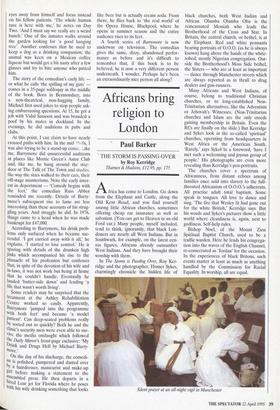Africans bring religion to London
Paul Barker
THE STORM IS PASSING OVER by Roy Kerridge Thames & Hudson, £12.95, pp. 175 Africa has come to London. Go down from the Elephant and Castle, along the Old Kent Road, and you find yourself among little African churches, sometimes offering cheap car insurance as well as salvation. (You can get to Heaven in an old Ford car.) Many people, myself included, tend to think, ignorantly, that black Lon- doners are nearly all West Indians. But in Southwark, for example, on the latest cen- sus figures, Africans already outnumber West Indians. And they have brought their worship with them.
In The Storm is Passfng Over, Roy Ker- ridge and the photographer, Homer Sykes, charmingly chronicle the hidden life of black churches, both West Indian and African. Olumba Olumba Obu is the reincarnated Messiah who leads the Brotherhood of the Cross and Star. In Britain, the central church, or bethel, is at the Elephant. Red and white pennants bearing portraits of O.O.O. (as he is always known) hang above the hands of the white- robed, mostly Nigerian congregation. Out- side the Brotherhood's Moss Side bethel, the Sisters — who are at least as important — dance through Manchester streets which are always reported as in thrall to drug dealers and gun-runners.
Many Africans and West Indians, of course, belong to traditional Christian churches, or to long-established Non- Trinitarian alternatives, like the Adventists or Jehovah's Witnesses. (Non-Trinitarian churches and Islam are the only creeds gaining membership in Britain. Even the RCs are finally on the slide.) But Kerridge and Sykes look at the so-called 'spiritual' churches, operating from headquarters in West Africa or the American South. `Rarely,' says Sykes, in a foreword, 'have I met such a welcoming and joyous group of people.' His photographs are even more revealing than Kerridge's pen-portraits.
The churches cover a spectrum of Africanness, from distant echoes among families once sold into slavery to the full- throated Africanism of 0.0.0.'s adherents. All practise adult total baptism. Some speak in tongues. All love to dance and sing. 'The fire that Wesley lit had gone out for the white British,' Kerridge says. But his words and Sykes's pictures show a little world where cleanliness is, again, next to godliness. Self-help rules.
Bishop Noel, of the Mount Zion Spiritual Baptist Church, used to be a traffic warden. Here he leads his congrega- tion into the waves of the English Channel, re-consecrated as 'Jordan' for the occasion. In the experiences of black Britons, such events matter at least as much as anything handled by the Commission for Racial Equality. In worship, all are equal.
Silent pray er at an all-night vigil in Manchester


























































 Previous page
Previous page